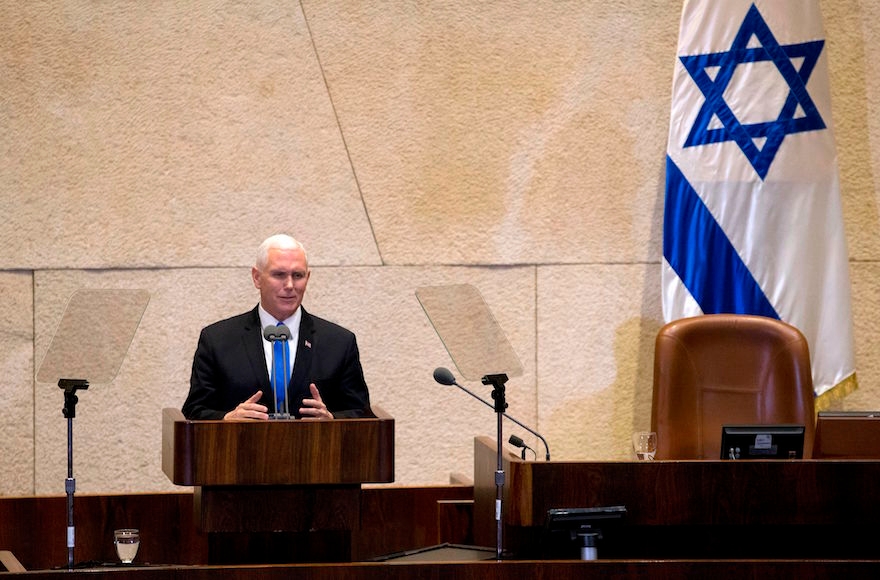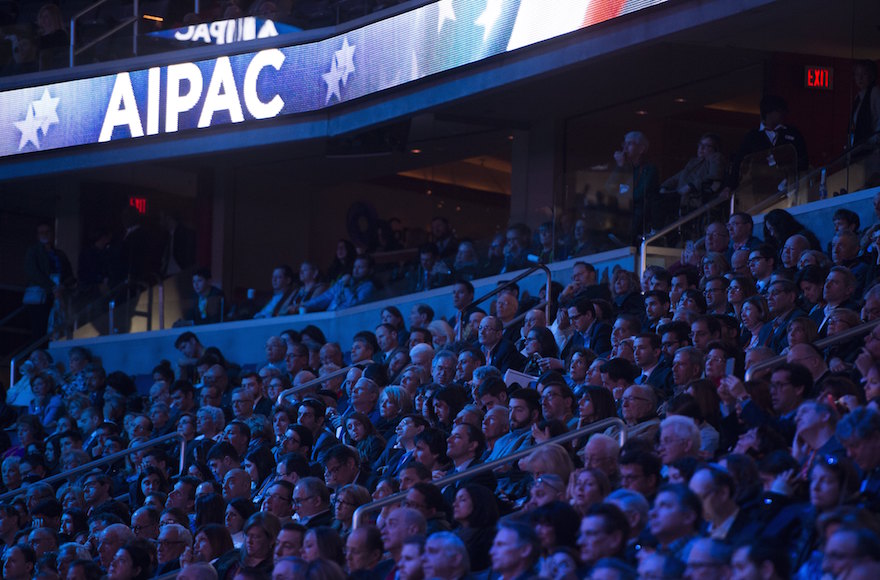What is AIPAC’s role in the age of Trump?
Published February 27, 2018
The fallout from that event will haunt the proceedings when 18,000 activists, including 3,500 students, attend the American Israel Public Affairs Committee conference here next week.
Navigating an increasingly polarized political landscape is the new reality for the lobby, which remains pre-eminent among pro-Israel groups and has long banked on bipartisanship.
Trump, on the one hand, has delivered on much of AIPAC’s agenda: He is moving the U.S. Embassy to Jerusalem; he is pushing Congress and America’s allies to toughen up the Iran nuclear deal; he is cutting funds to the Palestinians as a means of forcing them to align more with Israel and the West; and he has spoken forcefully against United Nations members who go against the United States on its Israel policies. AIPAC has advocated all of these policies in recent years.
At the same time, much of the Jewish community reviles Trump for his perceived bigotries and postures on a range of issues, including immigration, minority and women’s rights, and funding for social safety net programs. His approval ratings among Jewish voters remain bargain-basement low — 28 percent according to Gallup in January, “significantly below the national average,” the pollster said. That was after Trump had announced the embassy move and made clear his positions on the other issues that AIPAC favors.
AIPAC also has always claimed to speak for the American Jewish community on matters relating to Israel. But can the center hold when its delegates are so deeply divided — sometimes against themselves?
“It’s a real delicate balance,” said Neal Sher, who helmed AIPAC as executive director for a period in the mid-1990s before Howard Kohr assumed the post he still holds.
Sher said the pro-Israel credibility that Trump accumulated over his first year in office would guarantee a hearty reception for those representing his administration, including Vice President Mike Pence, U.N. envoy Nikki Haley and the ambassador to Israel, David Friedman.
“The conference this year, they’re going to be going nuts, it’s going to be like Trump at CPAC,” Sher said, referring to the ecstatic reception afforded the president earlier this month when he addressed the annual conference for political conservatives. “That’s going to be a problem when you look at Jewish demographics,” he said, referring to Jewish disaffection with Trump.
Some Jewish Democrats who once relished attending AIPAC now describe it as hostile territory.
“I feel the right wing has taken over the organization and there is no respect for other opinions,” said a former board member who is a major Democratic donor and once reached high enough in AIPAC’s ranks to chair a policy conference. “It’s just not a place for me anymore.”
The dilemma facing AIPAC was in evidence in March 2016, the day after Trump, then close to clinching the Republican presidential nomination, earned a round of cheers for saying Obama, then the incumbent president, “may be the worst thing to ever happen to Israel, believe me, believe me.”

Vice President Mike Pence speaking to the Israeli parliament in Jerusalem, Jan. 22, 2018. He will speak at this year’s AIPAC conference. (Ariel Schalit/AFP/Getty Images)
The following morning, the AIPAC brass appeared on stage to apologize for Trump’s behavior and the reaction.
“There are people in our AIPAC family who were deeply hurt last night and for that we are deeply sorry,” said Lillian Pinkus, the lobby’s president, her voice choking. “We are deeply disappointed that so many people applauded a sentiment that we neither agree with or condone.”
It was a sequence of events that pleased no one: Democrats despaired of the robust cheers Trump earned, Trump enthusiasts were shocked at the apology. (Reportedly so was Trump, and his displeasure was conveyed to AIPAC by a senior aide.)
Two years later the sequence still smarts — for both sides.
“They boo the president at the policy conference and it takes them 24 hours to apologize?” the former board member said.
Morton Klein, who heads the Zionist Organization of America and has emerged as a Jewish leader with some of the closest Trump administration ties, said an AIPAC apology was overdue.
“The first thing AIPAC should do is apologize for two years ago, for having the audacity to apologize for Trump’s speech,” he said.
Significantly, both the former board member Klein — along with multiple others — cited that moment without prompting as representing AIPAC’s crisis point.
It’s critical for AIPAC to figure out how to navigate those rough waters, said Tom Dine, Sher’s predecessor as executive director, if only to sustain the broad bipartisan support Israel has accrued over the decades.
“At this deeply divided and poisonous period in our politics and policy debate, AIPAC is needed now more than ever,” he said.
An AIPAC official said the path to bipartisanship ran through Congress.
“Bipartisanship is part of our DNA because it is the only proven way to secure the U.S.-Israel relationship for the long term,” the official said in an email. “At a time of polarization, our Policy Conference is an oasis of bipartisanship where we are united in the single goal of strengthening that relationship.”
An AIPAC insider said the focus on Congress would promote bipartisanship in an arena where the divisiveness Trump tends to elicit is not so apparent.
“AIPAC has always been about Congress; Congress is 90 percent of the relationship,” said the insider, who acknowledged that there was more AIPAC could do to cultivate the Democratic grassroots.
The problem with that strategy is that Republicans in Congress are increasingly identified with Trump. Indeed, some of AIPAC’s best Republican advocates in Congress, who were always careful to partner with Democrats in advancing pro-Israel legislation, are retiring this year in part because they can no longer abide Trump’s GOP. Among them are Ed Royce of California and Ileana Ros-Lehtinen of Florida — both leave behind influential foreign policy spots.
The seeds of partisan division over Israel precede the Trump presidency. The deep divide between the Obama administration and Israeli Prime Minister Benjamin Netanyahu’s government over Iran policy and settlements drove some Democrats away from reflexive support for Israel. AIPAC took Israel’s side more often than not in those disputes.
“When I joined AIPAC, it was a safe space for Democrats,” said Steve Sheffey, a pro-Israel and Democratic activist from the Chicago area. “It has become increasingly right wing, and not where the American Jewish community is, and in the age of Trump it’s become increasingly embarrassing.”
Last month, a Pew poll showed that the gap between how Republicans and Democrats view Israel is widening, “with 79 percent of Republicans saying they sympathize more with Israel than the Palestinians, compared with just 27 percent of Democrats.” Although some criticized its methodology, the poll reflected concern that Israel could rapidly become as politically divisive as abortion or gun control.

AIPAC conference participants at the Verizon Center in Washington, D.C., March 21, 2017. (Saul Loeb/AFP/Getty Images)
AIPAC is not ready to give up the fight. Members of Congress speaking at the conference are evenly divided between the parties and, in a let-bygones-be-bygones sign, include many Democrats who voted for the Iran deal. (Most backers of the Iran deal were absent from the last two conferences.) AIPAC is endeavoring to reconcile Democratic and Republican agendas on key legislative actions, including the Taylor Force Act, named for an American slain in 2016 by a Palestinian terrorist. It would cut funding to the Palestinian Authority until it stops payments to Palestinian attackers. Democrats want some carve-outs for humanitarian purposes, Republicans are resisting them.
Ann Lewis, formerly a communications director for the Clinton White House, is leading two sessions on reaching out to progressives.
Lewis said progressives were a critical constituency to cultivate because America was at a point where political positions are being set in stone for subsequent generations.
“From all the data I have seen, decisions about political identity is being decided now for years to come; we’re looking at a generational shift,” she said. “It is really important that support for the U.S.-Israel relationship be included.”
Then there was the point of view that AIPAC may as well cut its losses with one party and embrace the more natural fit.
Of course, what the natural fit is for a pro-Israel lobby depends on where you sit.
“The impact of Jews in politics is mostly in campaign contributions,” said Steve Rosen, a former AIPAC foreign policy chief who now works for conservative pro-Israel groups. And, he pointed out, the natural constituency for Israel’s policies increasingly is politically conservative Jews.
“If the future of AIPAC depends on becoming an organization of donors, that means looking to the Orthodox over time, who also happen to be more conservative politically,” Rosen said.
Jeremy Ben Ami, who heads J Street, the liberal Jewish Middle East policy group that at times has positioned itself as AIPAC’s rival, said catering to the Trump and Netanyahu governments would be a death sentence considering the American Jewish community’s political trends.
“The alliance between two leaderships that three-quarters of American Jews disagree with makes it hard to back an organization that exists only to support the Israeli government,” he said. “We’re in an era where the majority of American Jews want to be in opposition.”














